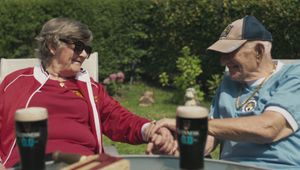
Latest Bodyform and Libresse Campaign Breaks Boundaries with #Bloodnormal

Bodyform and Libresse, feminine care brands of global hygiene and health company Essity, continue their mission to break taboos around periods with their latest campaign, #bloodnormal, in which period blood is shown realistically for the first time. They have also finally banished the blue liquid convention and replaced it with a realistic red. After all, women bleed blood.
At the heart of the campaign is a film created by AMV BBDO and directed by Daniel Wolfe, with cinematography by Monika Lenczewska. It shows young women in real life scenarios dealing with their periods.
The campaign is informed by the widespread omission of periods in mainstream culture and research demonstrating that 9 out of 10 women attempt to hide their periods – a clear demonstration of the stigma still attached to periods.
In a recent survey of 10,000 people conducted by the brand, more than one third of respondents thought of periods as taboo – ahead of mental health problems and the gender pay gap.
Meanwhile, 56% of girls questioned expressed a preference for being bullied at school rather than talking to their patents about periods.
The findings further fuelled the commitment to breaking taboos around periods, which resulted in the highly successful Red.fit campaign launched by Bodyform and Libresse in 2016.
Aside from Bodyform’s 20 second film, globally Libresse has released a longer #bloodnormal film. The different cuts reflect the different regulatory issues faced by different markets, but they all come from a single global #bloodnormal campaign with multiple activations to help provide positive periods images. These include a graphic story by renowned illustrator Victo Ngai, beautifully designed period underwear by French lingerie company Dessu, period jokes by twelve year old stand-up comedian Saffron Herndon, and commissioned a range of pad-shaped lilo’s. They have also worked with well-known influencers like former model and activist Victoire Dauxerre and Swedish fashion blogger Julian Hernandez.
Libresse and Bodyform will also be funding the creation of three further short films openly referencing periods in order to continue the normalisation of periods in global culture. These will be made by aspiring film talent and working with production company Flare Studio will offer a bursary to selected filmmakers to produce the short edits.
The #bloodnormal campaign breaks on October 17th. It will run across YouTube, Facebook, Instagram, Snapchat and programmatic with the 20 second as the hero film in the UK, and the long form film as the hero film in the Netherlands and Nordic markets.
Tanja Grubner, Global Marketing & Communications Director at Essity, comments: “Periods are a normal part of life, but are largely ignored by mainstream media. They simply don’t feature in the representation of female characters that we see every day. As a leader in feminine hygiene, we want to challenge the stigma around periods. We believe that like any other taboo, the more people see it, the more normal the subject becomes. We want to lead the way with a campaign that tackles the taboo head on by positively showing periods in action in everyday life truthfully and honestly - because we feel it’s the right thing to do for society.”
Nicholas Hulley & Nadja Lossgott, Creative Partners at AMV BBDO said: “As the film shows, while we have tackled some taboos, there is still so much more to be done. You make things normal by making them normal. And you break taboos by pushing against them.”
Daniel Wolfe, the film’s director adds: “Periods are still clearly taboo; the more women I chatted to of every age, the more I saw the taboo from a varied demographic. In the weeks running up to the shoot there was a number of interesting articles in the mainstream press challenging the status quo, and numerous pithy social media posts calling for change. ‘Can’t wait for the day when women no longer pass tampons to a friend like they are a Class A drug’ – was a quote which offered particular inspiration. We wanted to create something that provided a platform for discussion rather than trying to tell people what to think. And we hopefully made a film which isn’t defined by the gender of its director. A film which both women and men will take something from, hopefully helping instil the idea of a new normal.”















